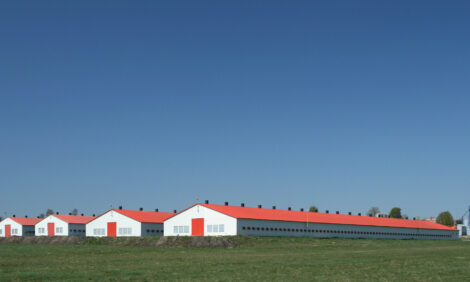



"Whole new business": Farmers innovate to get food from field to plate
From Europe to Asia and across the Americas, farmers and others in the global food supply chain are innovating to keep the world fed when populations are told to stay home, street markets are closed and labourers cannot travel to work in the fields.- Coronavirus pandemic brings upheaval to food supply chains
- Farms seek buyers online to avoid destroying crops
- Without migrants, farmers hire furloughed factory workers
- Pasta, flour makers work overtime to keep shops supplied
Reuters reported that Didier Lenoble has gone online to sell vegetables grown on his farm near Paris as the usual street stalls he supplies are temporarily shut because of the coronavirus crisis.
"It's a whole new business," said Lenoble, whose family-run farm has been selling to customers via a new website.
Elsewhere, an Indian farming cooperative is delivering direct to city dwellers as a lockdown closed its usual distribution channels and a Mexican supplier to US berry giant Driscoll's has hired furloughed factory workers to pick produce.
The coronavirus pandemic has put a huge strain on the complex chains that usually bring food to people's tables, forcing suppliers to adjust their normal routines to cope with snags to harvesting, transport and distribution.
The crisis has exposed the world's reliance on international trade and on a vast number of seasonal workers who usually travel from farm to farm, often crossing borders, to help gather in produce as it ripens.
Parts of the chain are creaking. The closure of processing plants due to coronavirus outbreaks has threatened US meat supply, while some farmers have left crops to wither in the fields as labourers cannot reach them.
But many farms and firms are adapting quickly.
Lenoble's website has helped him restore sales volumes to about half their normal level, saving part of his lettuce and radish crop from being destroyed.
Rungis wholesale centre south of Paris, Europe's biggest food market, launched an online service that made 250 home deliveries a month ago and now makes 6,500 a week in and around the French capital.
"Eliminating middlemen"
India's Sahyadri Farms, a cooperative in the western state of Maharashtra that processes fruit and vegetables for export, now makes daily deliveries to 3,000 urban consumers, who order online, after a nationwide lockdown disrupted supply chains and left some farmers feeding their crops to cattle.
"As we are eliminating middlemen in the distribution chain, both farmers and consumers are happy," said Sahyadri Chairman Vilas Shinde.
In the United States, restaurant owners and suppliers are taking a new approach. Chicago-based restaurant Park and Field sells grocery and meal boxes to households, while Gunthorp Farms in Lagrange, Indiana is selling chicken that was once bound for high-end Chicago restaurants direct to consumers.
For some suppliers, the challenge has been keeping up with demand for staples such as eggs, flour and pasta, which have flown off supermarket shelves as people stock up to eat at home.
Pasta and flour makers in North America and Europe are running some production lines round the clock and have reduced their ranges to maximise volumes.
Other suppliers are turning to new pools of workers.
US berry distributor Driscoll's has taken on laid-off restaurant and hotel employees at its US distribution warehouses to work as forklift drivers and quality assurance inspectors, the firm's president, Soren Bjorn, said.
Green Gold Farms in Mexico, a supplier to Driscoll's, has hired factory workers like Omar Cortes Arteaga, who was furloughed from an automotive plant. He works at Green Gold's berry farm in Jalisco state, where labourers wear masks and have temperature checks before going into the fields.
"The job is helping me with my bills," said the maintenance technician. "Here I do chores, carry pots, prune plants."
New recruits
Finding seasonal workers is a priority in Europe, where spring harvests are at risk because the usually vast armies of migrant labourers cannot leave home.
Spanish asparagus grower Jaime Urbina cannot turn to an eastern European workforce as he usually does. "They are stuck in their countries because the borders are closed," he said.
Spain, the European Union's biggest fruit and vegetable exporter, has responded by allowing the unemployed to take farm jobs while keeping welfare payments, and has extended work permits for those migrants already in the country.
France has mobilised 15,000 French workers idled by the crisis so far to help offset a potential shortfall of 200,000 foreign labourers this spring.
"It's positive for farming because these are profiles that are not usually drawn towards seasonal work," said Jean-Baptiste Vervy, head of Wizifarm, a start-up behind a job-matching website that took off in the lockdown with government backing.
But he said some farmers were frustrated that the new recruits lacked skills or had quickly quit.
Poland, meanwhile, is struggling without Ukrainian seasonal labourers and the Russian Agriculture Ministry said prisoners might help out on farms in the absence of Central Asian workers.
Germany, Britain and Ireland are allowing companies to bring in trained workers from Romania and other European Union states on charter flights with quarantine measures.
US President Donald Trump has exempted such migrants from a temporary curb on immigration during the crisis.
Elsewhere, Nigeria's federal government is making identity cards so farm workers can move freely during a national lockdown after many were stopped by police.
Iraq's Agriculture Ministry said farm workers were exempted from curfew measures and farmers were allowed to move harvesting machinery around the country.
To keep transport links running smoothly, Brazilian toll-road operator CCR SA has distributed more than 1,000 food and hygiene kits a day to truck drivers as service outlets are closed.
In Kenya, Rubi Ranch has been sending avocados to Europe by ship due to limited air freight capacity, as airlines have grounded aircraft and cut off the company's usual supply route.









